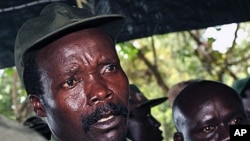The State Department’s chief Africa diplomat said Wednesday U.S. troops sent to Uganda to help local forces fight the Lord’s Resistance Army rebel group will not engage in combat operations themselves. Assistant Secretary of State Johnnie Carson says the marauding LRA has been degraded but remains a serious threat to Uganda and three neighbors in Central Africa.
Carson says President Obama’s decision in October to deploy about 100 special forces troops to try to help crush the marauding LRA has spawned “conspiracy theories” about U.S. intentions.
But the assistant secretary of state says the U.S. interest is humanitarian, to help end once-and-for all a 25-year campaign of abduction and mayhem by the LRA led by its messianic founder Joseph Kony.
At a policy seminar at the U.S. Institute of Peace in Washington, Carson said the troops now beginning to deploy in LRA stronghold areas, are there as advisers to help forces of the four affected countries develop the military skills to end the long-running conflict.
“This is all-important: we’ve not there simply to demonstrate goodwill," said Carson. "We’re there to help achieve an objective. And that objective is to end the scourge and violence of the LRA and to help bring Joseph Kony to justice.”
Kony and his rebels are accused of killing, maiming and abducting tens of thousands of civilians since the 1980s in a California-sized region of remote central Africa jungle that includes parts of the Central African Republic, the Democratic Republic of the Congo and the new state of South Sudan in addition to their original stronghold in western Uganda.
Carson said the number of core LRA fighters has dwindled to between 150 and 200 in the face of Ugandan-led military operations in recent years. But he said the group has bounced back from past setbacks, and said the hope is that the new U.S. advisory presence will prove decisive.
“Contrary to some conspiracy theories in the press, this deployment is focused on the LRA and the LRA alone," added Carson. "Second, although we are sending equipped personnel, combat-equipped personnel, they have these weapons only for self defense in case they come under attack. The U.S. forces in this operation are there to play a supportive role to the [Ugandan] UPDF and national militaries pursuing the LRA - not to engage in combat.”
Carson also said the U.S. troop commitment, the largest to an African conflict zone since a Marine contingent went to Liberia in 2003, is not open-ended and its progress will be regularly reviewed.
Carson was joined at the USIP event by officials of non-governmental groups including former U.S. diplomat William Bellamy, director of Washington’s Africa Center for Strategic Studies, who said the conflict is likely to persist as along as Kony remains at large.
“Is there still a viable peace track? I think most observers have concluded there is no pure military solution to this," said Bellamy. "But nor is there any plausible negotiating scenario as long as Joseph Kony is in charge. And I think ambassador Carson made that very clear. I think lesson number one is that if the pressure is relaxed they will use the opportunity to regroup and prepare for the next round of atrocities.”
Michael Poffenberger, executive director of the anti-LRA advocacy group Resolve, said the current situation offers the best chance to defeat the group since 2008.
But he said under-estimation of the LRA’s capability has helped it survive over the years, and said he still fears Kony might be able to outlast President Obama as he did his four predecessors.
US: No Combat Role for Troops in Uganda













